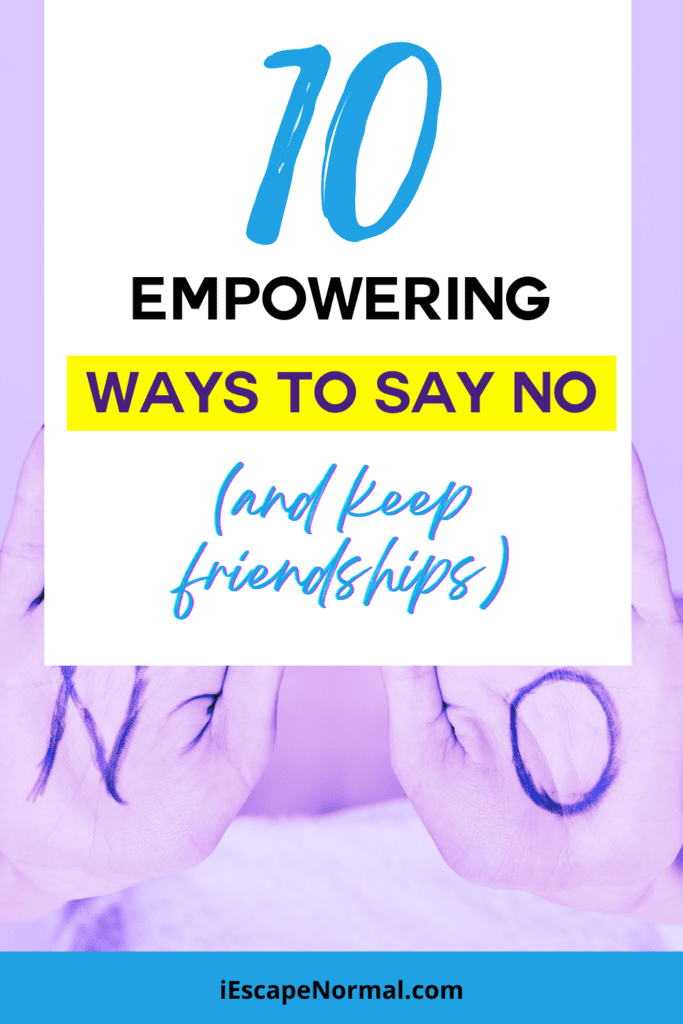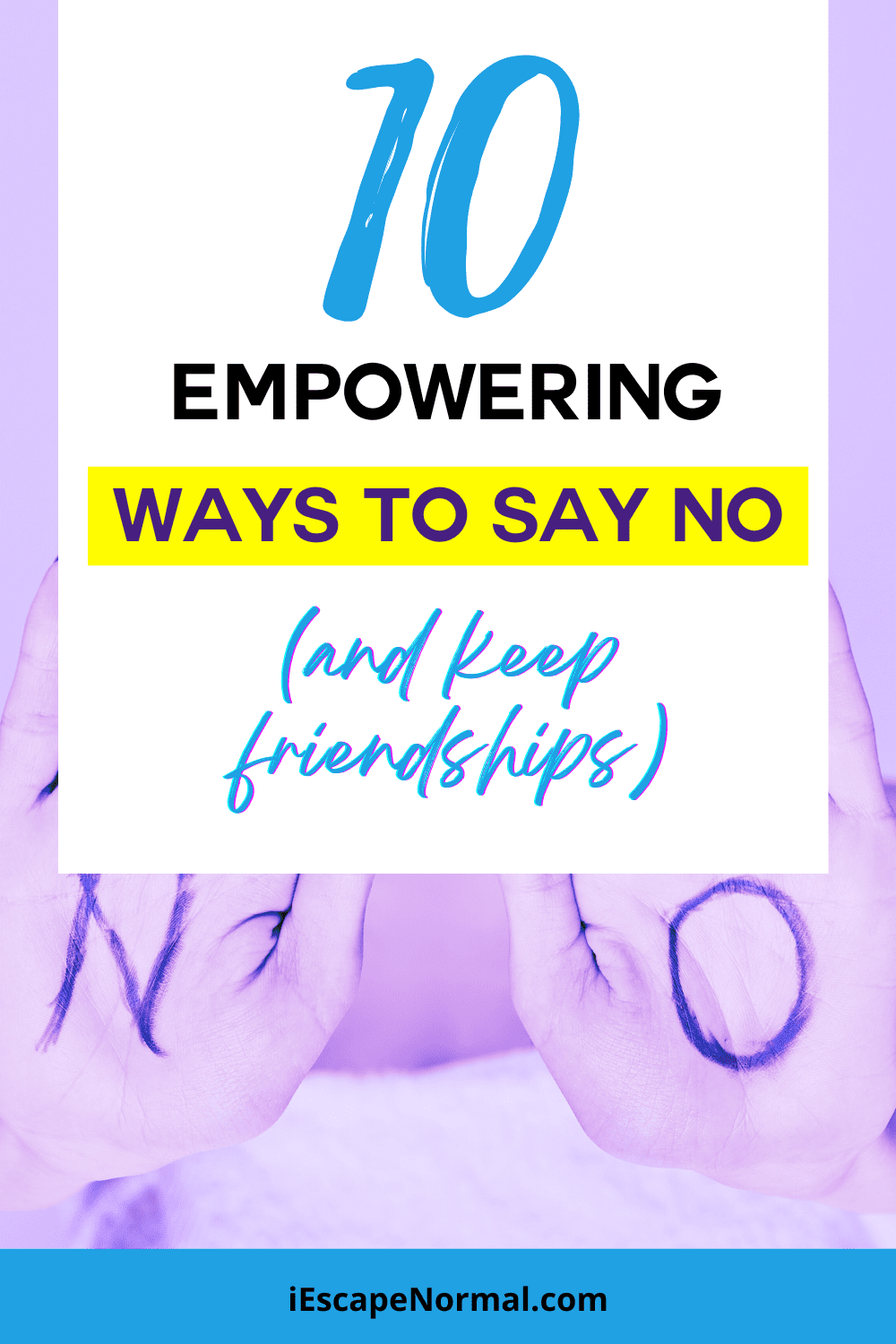10 Empowering Ways to Say No (and keep friendships)
We’ve all been there – finding ourselves saying Yes and regret it later wishing we’d just said No!
How often do you find it difficult to say no? Do you say yes just to be nice but really don’t want to?
Well, you’re not alone. I used to find it hard, too, because I wanted to please everyone and just be nice.
Well, I’m a “Say No” sistah these days and loving it and I want you to learn more ways to say no too with confidence, assertiveness, and without guilt!
Why We Find It Hard To Say No
It’s only a little two letter word right? Okay, say it with me aloud: NO.
I didn’t hear you. Say it loud – NO!
Feels good doesn’t it 🙂
But you don’t say it as often as you probably should. Why?
Here are some reasons why we often find it hard to say no.
- You’re such a kind and caring soul, always ready to lend a helping hand. Saying no isn’t easy for you because you genuinely want to assist others and hate the thought of turning someone away, even if it means sacrificing your own time.
- Saying no feels like a challenge because you were brought up with the belief that it’s impolite, rude, or disrespectful, especially when dealing with people of higher authority.
- Another reason you find it hard to say no is that you simply want to be agreeable. You value your relationships and don’t want to rock the boat by disagreeing with others. It’s natural to want to fit in and be part of the group, even if it means sacrificing your own needs or desires.
- The fear of conflict also plays a role in your hesitation to say no. You worry that rejecting someone’s request might lead to anger or confrontation. Even if things don’t escalate immediately, there’s a fear that your refusal could strain the relationship or have negative consequences down the road or that they’ll “retaliate” somehow if you ever ask them for something.
- Then there’s the fear of missed opportunities. Saying no can feel like closing doors, and that’s a scary thought.
- And let’s not forget about the fear of burning bridges. Saying no can be interpreted as rejection, which might strain relationships or lead to severed connections. We all want to maintain positive connections with others, so it’s understandable why you might feel reluctant to say no and risk damaging those relationships.
But here’s the thing: by avoiding saying no, you’re actually sacrificing your own time, needs, and even your own happiness. You deserve to prioritize yourself and the things you genuinely want (or need) to do. It’s okay to set boundaries and protect your well-being.
You have the power to change this dynamic. Recognize that saying no doesn’t make you a bad person or mean that you don’t care about others. It’s about honoring your own needs and values. When you start saying no when appropriate, you’ll reclaim your time and energy. You’ll feel empowered and more in control of your own life.
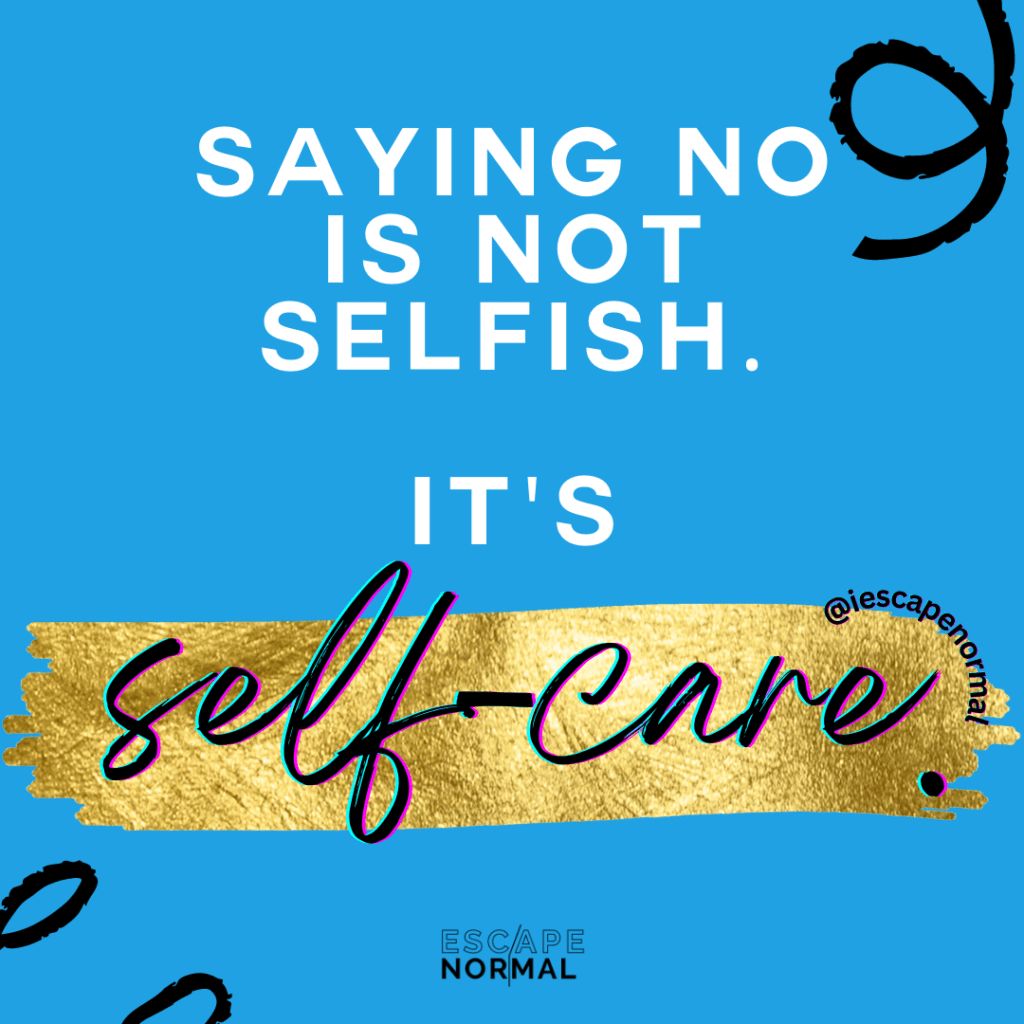
10 Empowering Ways to Say No
Telling others no doesn’t have to be difficult. If you struggle with the concept, here are some ways to say no – assertively – that you can put to use immediately.
- Saying no outright, no explanation needed, and/or just a definitive No.
“No, but thanks for considering or thinking of me regarding this.”
OR “No, but I’m very flattered that you’ve asked me.”
OR “I hate to disappoint you, but I’m not able to do this. I’m afraid I’ll overextend myself.” - Saying no when you are not sure how to reply, need time to prepare an answer or need time to consider something.
“I’m in the middle of doing work / a meeting right now. Can I let you know once I’ve checked my schedule later?
OR “I have a tight deadline this week. Can I get back to you in a few days’ time?” - Saying no to handle other people’s non-urgent problems and issues which you don’t want to deal with right now.
“Work is really busy this month. So sorry about that. Can it wait until next week or next month?”
OR “I’m not currently in a position where I can take on this responsibility. Could we talk about this at another time if there’s a change in my circumstances?” - Saying no and suggesting someone else who can do the task.
“Jane loves doing (insert task) – she can help you with that / Jane is the best person who can help you with that.”
OR “I don’t feel comfortable / not confident to help you with that but Sarah might be able to.” - Saying no when dealing with people who like to take advantage and keep asking you to do favors for them.
“I’m too occupied to do that right now, but I can show you how you can do it for yourself.” - Saying no when dealing with overwhelming or too many demands.
“Which task should I focus on first?”
OR “Of the tasks you’ve asked of me already, which is higher priority?” - Saying no when you’d really like to help but can’t right now.
“I’d love to help but I’m focusing on _______ right now.”
OR That sounds great and I would help but I don’t have time for anything except ________ at the moment.” - Saying no to loaning money. (my personal favorite!)
“I really wish I could but I make it my practice not to loan money to friends and family.” - Saying no when you truly have to think about it. This is more of a “maybe” than an absolute “no.” Avoid using this option if you really do want to say no.
“Please give me time to consider it and and I’ll get back to you by [date].” - Saying no when someone is trying to sell you something you don’t want. And remember, you’re rejecting their product or service; you’re not rejecting them personally.
“Right now, your offering doesn’t meet my needs but I’ll get back to you if my needs change.”
If you’ll learn to say “no” to the things that you really don’t want to do, don’t have the time to do, or don’t fit your needs, you will learn to set better boundaries and your life will be much richer for it!
But like many other things in life, it gets easier with practice. After you get used to it, you’ll be surprised how easy it is and how receptive others can be.
Remember to only tell the truth. One of the options above is bound to be true. There’s no reason to feel like you’re being dishonest. Now go tell some people “no” and see how much better you feel!
Let today mark a new beginning for you. Give yourself permission to say NO without feeling guilty, mean, or selfish. Anybody who gets upset and/or expects you to say YES all of the time clearly doesn’t have your best interest at heart, Always remember: You have a right to say NO without having to explain yourself. Be at peace with your decisions.
Stephanie Lahart
How to Say No, The Manifesto
Celestine Chua, over at The Personal Excellence Blog, created this handy dandy manifesto offering ways to say no in a clear visually compelling format. Check it out!
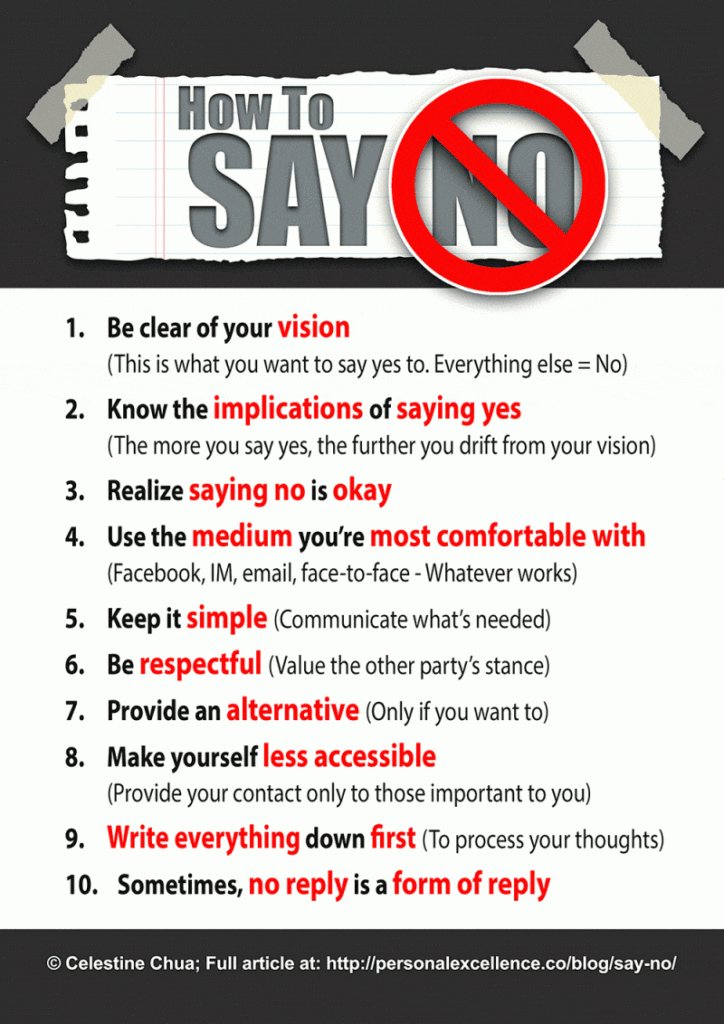
Source: The Personal Excellence Blog
Say No and Still Be Friends
Another piece to this phenomenon that many people struggle with is saying no to friends and family. Who doesn’t want to help a friend or family member who asks for your help?
Unfortunately, there are times you simply need to say no and it can be awkward because no one wants to risk a friendship. To help you with this, take heed to these few principles so you can say no without damaging your friendships.
- Make sure you didn’t misunderstand anything. Misunderstandings are common. Maybe you didn’t hear what you thought you heard. Get clarification before
you say yes or no. Maybe you’ll be able to say yes, if you first seek to understand. - Separate the issue from those involved. Once you’ve gotten clear on the issue and determined that you’re not getting involved, remember that you’re still friends. Being friends is separate from the issue at hand. Make sure they understand that it’s the issue or your own situation that’s preventing you from saying yes, not them.
- Keep the focus on yourself, not your friend. It doesn’t go over well if you say something like, “I can’t lend you money because everyone knows you’ll never pay it
back,” although that’s what you’d likely WANT to say. LOL Let them know that you care, but explain why you can’t help. (See #9 above regarding loaning money). - Be firm and clear in your no. Don’t give weak, wishy-washy answers that give the other person hope that you might change your mind. Just give a clear no, which ends the issue quickly. It’s like pulling off a Band-Aid with one quick pull.
- Figure out the underlying need. If you can determine what she really needs, you can help your friend come up with another solution. Sometimes, a person in need doesn’t have the capacity to find more elegant solutions. You could be of great assistance by taking the time to brainstorm and look for other alternatives in which you aren’t involved.
- Find another way to help them. Maybe you could help with the current issue in some smaller capacity. Offer other suggestions. Maybe they have another need where you would be happy to provide help and support.
It’s never easy to say no to a friend. But sometimes saying no is the only way to maintain a friendship. If helping someone comes at too great a cost, you’ll end up feeling resentful, which can kill the relationship altogether.
It’s Okay to Say No. (Reflection Exercise)
Say these words below to yourself to learn how to assertively, positively, and confidently say no.
My time is precious and I choose to spend it how I please. I can only expect to achieve success without burnout when I am focused on my goals and aware of my limitations. For this reason, I am able and willing to say no when the need arises.
I prioritize the people and activities in my life. I let go of the idea that I should be able to come up with enough energy and be instantly available for every person and every activity that comes my way WITHOUT feeling guilty or creating excuses because I know that it is okay to say no.
I feel comfortable saying no to others, assertively and confidently, knowing that my feelings are at least as important as the feelings of my friends or loved ones.
I only take on what I am sure I can accomplish in the time frame requested so others know they can trust me to complete their requested tasks when I agree to do them.
Today, I am confident about saying no to others if I so choose. I plan to speak up more about my feelings in the future, even if this means saying no more often.
Self-Reflection Questions:
- Do I keep my goals in mind when deciding how to spend my time?
- Do my friendships/relationships help or hinder me in reaching my goals?
- Do I believe it is okay for me to tell others “no?” If not, why not?
- How can I feel better about asserting myself?
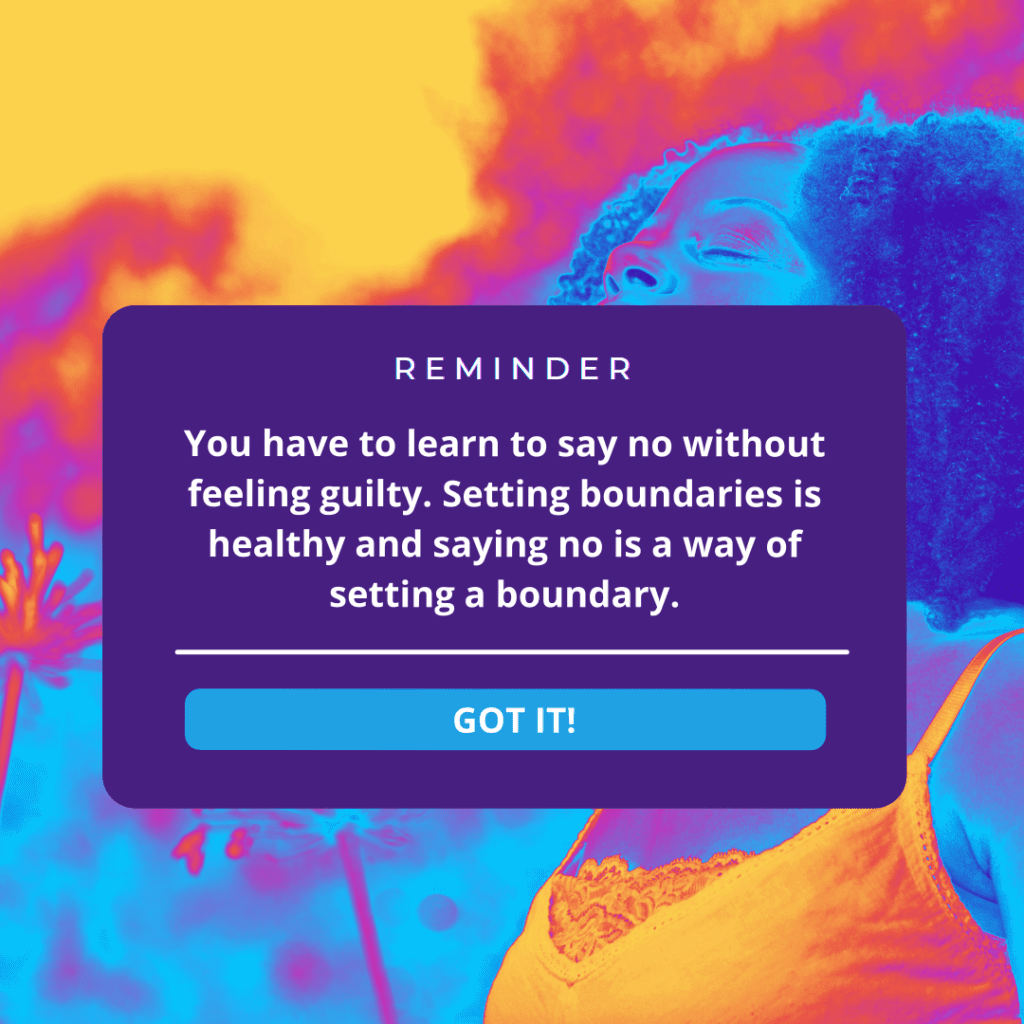
Resources
1. Learning How to Say No When You Usually Say Yes: Everything You Need to Know Explained Simply – Book
2. When I Say No, I Feel Guilty – Book
Over to you…
Do you find it hard to say no? What strategies will you use going forward to ensure you know how to say no with confidence?
Tell me in the comments below!
*This post contains affiliate links so we may earn a small commission when you make a purchase through links on our site at no additional cost to you. Thanks for your support!
